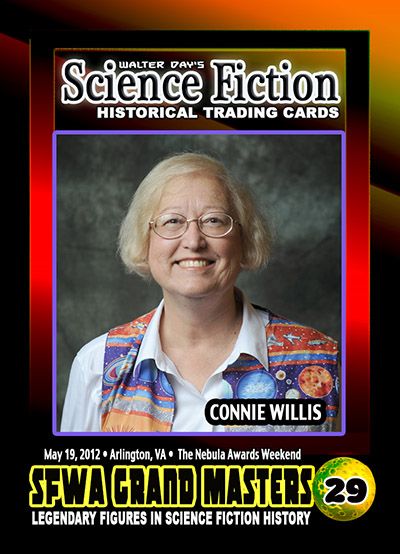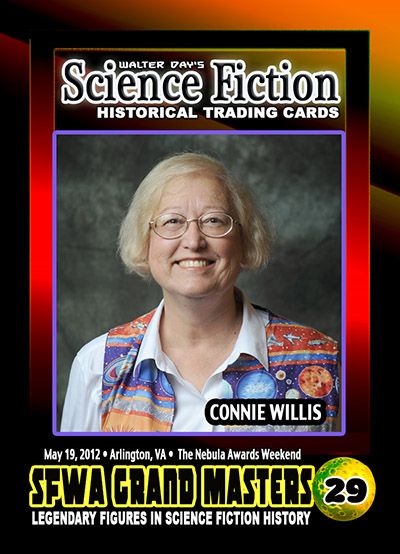- Home
- Articles
- Trading Card Spotlight
- Science Fiction Trading Card Spotlight - Connie Willis
Science Fiction Trading Card Spotlight - Connie Willis
Our first Science Fiction Trading Card Spotlight features Connie Willis, who is displayed on card number 29, from the Science Fiction Collection. Connie is the Nebula and Hugo Award-winning classic books, "Doomsday Book", "To Say Nothing of the Dog", and "BlackOut' and "All Clear". She has won a total of 7 Nebula Awards and 11 Hugo awards, and is the first author to win both awards in all four fiction categories. Her latest novel is a romantic comedy abount Telepathy called "CrossTalk". Her next project she is looking into is a novel about Agatha Christie.
How early in your life did you know you would be a writer and what paths did you take to become one?
I made up stories with my dolls for as long as I can remember, but didn’t start writing stories till high school, and I did all the stuff you might expect, majored in English, joined a workshop,etc. But what I really did was read and read and read. Writers I loved, writers I thought were good, writers who were terrible (so I could dissect their stuff and NOT DO THAT.) That’s also my advice for writers--read everything you can get your hands on. It’s the best way to learn to write, and I’m constantly astonished by writers who say, "Oh, I don’t really read much." How can you possibly be a writer if you don’t read?
How have books today changed from when you were younger? What do you like or dislike about the changes?
There is no way to answer that question without sounding like some old guy standing on his porch yelling, "Get off my lawn!" The publishing industry constantly changes, often in inexplicable and maddening ways. My advice is to just control the part you CAN control, i.e., the writing, and not stress about the rest.
If you could describe Walter Day in one word, what would that word be and why?
Dedicated. His devotion to preserving and disseminating science fiction is impressive. I’m always amazed by how many wonderful people there are who put on conventions, make lists and fanzines and encyclopedias just for the love of it. Thank goodness for them--and for Walter Day.
What are your favorite type of books to read and why?
I love mystery novels, and I still love science fiction short stories, which first attracted me to the field after Heinlein’s novels. Lately I’ve been rereading the Year’s Best collections from the 50s and 60s and 70s and marveling over how many great stories there were: Alfred Bester’s "Casey Agonistes" and "The Great Pat Boom" by Damon Knight" and "Pretty Maggie Moneyeyes" by Harlan Ellison and Philip K. Dick’s "I Hope We Shall Arrive Soon" and Frederic Brown’s "Puppet Show."
What do you think about e-books that you can download versus the actual physical hard copy?
Books are books as far as I’m concerned. I think e-books are great (especially for travelling) and audiobooks and graphic novels--anyway a story can be told is fine by me. And I also love movies. And TV shows. Have I ever told you how great the BBC’s PRIMEVAL was? (Note: Of course, I have. I tell everybody. How much I loved that show has become a standing joke. But it WAS a great show--wonderful characters, terrific writing, plot twists even I didn’t see coming. You definitely need to watch it.)
What authors do you admire today and who did you look up to as a child?
I love Dorothy Sayers and Joan Didion and Agatha Christie and of course Jane Austen, who gets better every time I read her. And Alan Bennett’s THE UNCOMMON READER and Anthony Trollope’s THE WARDEN and Sigrid Undset and Ursula Curtiss and Ray Bradbury and Philip K. Dick and Edgar Allan Poe and... oh, the list goes on and on. I also love movies, as I said before, especially romantic comedies like FATHER GOOSE and WALK, DON’T RUN and THE DECOY BRIDE, and movies with killer scripts, like GOSFORD PARK and QUIZ SHOW and SPOTLIGHT, and, oh, that list goes on and on, too. As a kid, I first fell in love with science fiction through Heinlein and then Ray Bradbury and all the short stories--Theodore Sturgeon’s "The Man Who Lost the Sea" and Kit Reed’s "The Wait," and Daniel Keyes’ "Flowers for Algernon" and James Tiptree’s "And Her Smoke Rose Up Forever." I also loved what I called "long dress books," like A LITTLE PRINCESS and ANNE OF GREEN GABLES and the BETSY, TACY, TIB books, and of course LITTLE WOMEN.
Of the books you have written, which one is close to your heart and why?
I always love the book I just finished writing and HATE the one I’m working on, but I guess I’d have to say "Fire Watch" for two reasons: 1) It was the first story where I actually managed to get the story in my head onto the page. And 2) I think St. Paul’s Cathedral is the most beautiful place in the world and we are SO lucky to still have it, and I just wanted to show how precious it is--and how fragile all beautiful things are.
You have won many awards in your career. Which one are you most proud of and why?
That’s a hard question--I’m proud of ALL my awards, but I guess I’d say I’m most proud of the Hugo and Nebula I won for my World War II novel, BLACKOUT and ALL CLEAR. I poured eight years of my life and my heart and soul into writing that book, and the writing of it nearly killed me as it morphed from one volume into two and got later and longer and my editor completely lost patience with me, and I’m so glad people liked it. I’d also like to say that I’m well-aware of what rewards DON’T mean and always try to keep in mind the fact that Fred Astaire never won an Oscar.
If you did not become a writer, what would you be doing?
A teacher. I got my college degree in elementary ed and English, and I taught the first two years I was married and then subbed for many more while I tried to get my writing career started, so I’d probably be teaching fifth graders somewhere (NOT Florida or Texas.)
What do you see yourself doing in the next 5 years?
Old writers never die. They just keep going till they can no longer hold a pen--or can’t remember what it’s for. I’m currently working on a new Oxford historian time-travel novel called THE SPANNER IN THE WORKS, about a tourist who accidentally stumbles into the net in 1975 and ends up in the future (which, if you’ve read my other time travel books, you know is scientifically impossible.) After that, there’s a novel about Agatha Christie I have my heart set on writing, and a book about the craft of writing, and ...but it all depends on how long I last.


